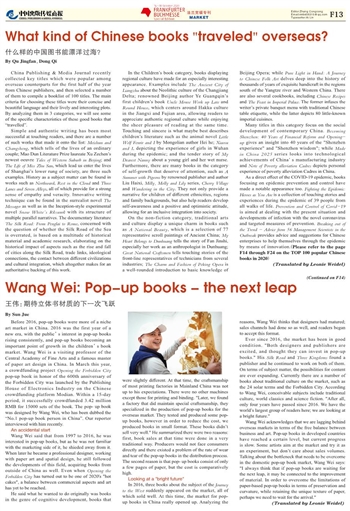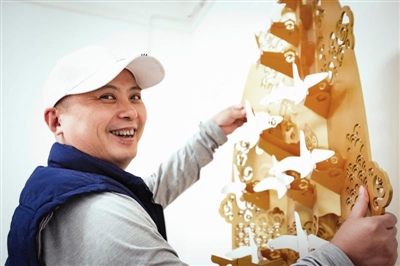By Sun Jue
Before 2016, pop-up books were more of a niche art market in China. 2016 was the first year of a new era, with the public’s interest in pop-up books rising consistently, and pop-up books becoming an important point of growth in the children’s book market. Wang Wei is a visiting professor of the Central Academy of Fine Arts and a famous master of paper art design in China. In March this year, a crowdfunding project Opening the Forbidden City pop-up book in honor of the 600th anniversary of the Forbidden City was launched by the Publishing House of Electronics Industry on the Chinese crowdfunding platform Modian. Within a 15-day period, it successfully crowdfunded 3.42 million RMB for 15000 sets of the book. The pop- up book was designed by Wang Wei, who has been dubbed the “No.1 pop-up book person in China”. Our reporter interviewed with him recently.
An accidental start
Wang Wei said that from 1997 to 2016, he was interested in pop-up books, but as he was not familiar with the marketing side of it, he shieded away from it. When later he became a professional designer, working with paper art and spatial design, he still followed the developments of this field, acquiring books from outside of China as well. Even when Opening the Forbidden City has turned out to be one of 2020's "hot cakes", a balance between commercial aspects and art has yet to be reached.
He said what he wanted to do originally was books in the genre of cognitive development, books that
were slightly diferent. At that time, the craftsmanship of most printing factories in Mainland China was not up to his expectations. There were no other machines except those for printing and binding. "Later, we found a factory that did maintain special craftsmanship, they specialized in the production of pop-up books for the overseas market. They tested and produced some pop-up books, however in order to reduce the cost, we produced books in small format. These books didn’t sell very well." He summarized there were two reasons: first, book sales at that time were done in a very traditional way. Producers would not face consumers directly and there existed a problem of the rate of wear and tear of the pop-up books in the distribution process. The second reason is that pop- up books consist of only a few pages of paper, but the cost is comparatively high.
Looking at a "bright future"
In 2016, three books about the subject of the Journey to the West suddenly appeared on the market, all of which sold well. At this time, the market for pop-up books in China really opened up. Analyzing the
reasons, Wang Wei thinks that designers had matured; sales channels had done so as well, and readers began to accept this format.
Ever since 2016, the market has been in good condition. "Both designers and publishers are excited, and thought they can invest in pop-up books." His Silk Road and Three Kingdoms found a publisher and he continued to work on both of them. On terms of subject matter, the possibilities for content are ever expanding. Currently there are a number of books about traditional culture on the market, such as the 24 solar terms and the Forbidden City. According to Wang Wei, conceivable subjects include traditional culture, world classics and science fiction. "After all, only four years have passed since 2016. We have the world’s largest group of readers here; we are looking at a bright future."
Wang Wei acknowledges that we are lagging behind overseas markets in terms of the free balance between business and art. Pop-up books in developed countries have reached a certain level, but current progress is slow. Some artists aim at the market and try it as an experiment, but don’t care about sales volumes. Talking about the bottleneck that needs to be overcome in the domestic pop-up book market, Wang Wei says: "I always think that if pop-up books are waiting for the next leap, it may be connected to the improvement of material. In order to overcome the limitations of paper-based pop-up books in terms of preservation and curvature, while retaining the unique texture of paper, perhaps we need to wait for the arrival."
(Translated by Leonie Weidel)



